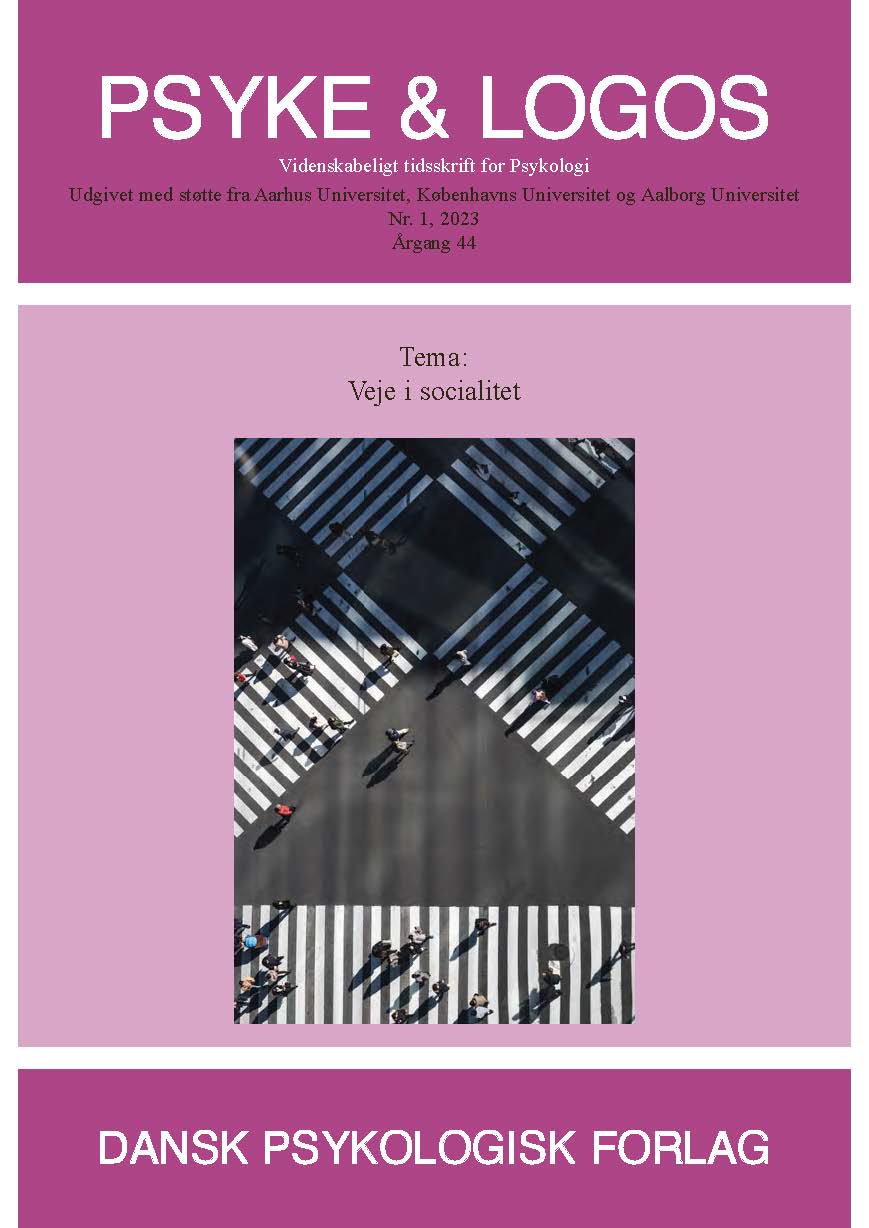Sporting Socialities Revisited – Experience rather than Ability
DOI:
https://doi.org/10.7146/pl.v44i1.141117Keywords:
sport, curiosity, humility, performance pressure, instrumentalism, life skillsAbstract
Sporting communities are a significant and widely distributed kind of sociality in a Danish context. In order to reverse the decreasing well-being amongst Danish youth, sporting communities have been urged to offer a breathing space from the performance pressure of everyday life. Current approache have an explicit non-performance focus in their recommendations for youth
sports. At the same time, these approaches do not rid themselves of performances. Instead, they face the risk of moving performances to a non-sportive domain consisting of skills that enables the young to master an athlete’s life. The present article offers an empirically grounded understanding of the breathing space aimed at supplementing the current sportive and non-sportive
skill-centred view. Based on interviews with an experienced coach, this is unfolded as certain experiences rather than the development of abilities. The central experiences are: The joy of giving and curiosity. These are manifested in the pursuit of togetherness in the group and are presented as experiences worthy of pursuit for their own sake. Finally, I will shed light on the developed understanding using Aristotle’s distinction between activity and process and Heidegger’s exploration of the nature of technology.
References
Andersen, M.L. (2021). DGI: For mange unge mistrives. Vi skal væk fra præstationspresset. Danske Gymnastik- & Idrætsforeninger. https://www.dgi.dk/om/presse/presserum/seneste-nyt/dgi-for-mange-unge-mistrives-vi-skal-vaek-fra-praestationspresset.
Aristoteles (2000). Etikken. Det lille forlag.
Aristoteles (2021). Metafysik. Klim.
Braun, V. & Clarke, V. (2006). Using thematic analysis in psychology. Qualitative Research in Psychology, 3(2), 77-101. https://doi.org/10.1191/1478088706qp063oa
Brinkmann, S. (2005). Et pragmatisk dannelsesideal i selvdannelsens epoke.Nordic Studies in Education, 25(3), 245-258. https://doi.org/10.18261/ISSN1891-5949-2005-03-06.
Det Danske Sprog- og Litteraturselskab (2003). Præstation. https://ordnet.dk/ddo/ordbog?query=præstation&tab=for
Dideriksen, S., Jørgensen, S., Svendsen, A.M., Ryom, K. & Storm, L.K. (2022, august). Ungdomstræneren som kulturel leder: Et multicase pilotstudie af tre træneres praksis. Forum for Idræt, 37(2), 14-37
Gould, D., Collins, K., Lauer, L. & Chung, Y. (2007). Coaching life skills through football: A study of award-winning high school coaches. Journal of Applied Sport Psychology, 19(1), 16-37. https://doi.org/10.1080/10413200601113786
Hansen, J. (2020). En kulturhistorisk tilgang. I: S. Ravn & S.H. Larsen (red.), Krop og bevægelse i idræt og sundhed: kulturanalytiske tilgange (s. 27-40). Syddansk Universitetsforlag.
Heidegger, M. (1953). Spørgsmålet om teknikken. Philosophia: tidsskrift for filosofi, 24, 1-2. 1995), 7-28.
Henriksen, K. (2015). Træneren som kulturel leder: Bæredygtig sportspsykologi for unge talenter. I: K. Ryom., K. Henriksen & N.N. Rossing (red.) Talentudvikling i sport: Reflekterede organisationer, gode teams og stærke atleter (s. 20-35). Aalborg Universitetsforlag.
Henriksen, K. & Larsen, C.H. (2016). Sportspsykologi. I: K. Bertelsen et al. (red.), ATK 2.0 Træning af børn og unge (s. 192-223). Team Danmark
Herrebrøden, H. & Bjørndal, C.T. (2022). Youth international experience is a limited predictor of senior success in football: The relationship between U17, U19, and U21 experience and senior elite participation across nations and playing positions. Frontiers in Sports and Active Living, 4, 135. https://doi.org/10.3389/fspor.2022.87553
Junggren, S.E., Elbæk, L. & Stambulova, N.B. (2018). Examining coaching practices and philosophy through the lens of organizational culture in a Danish high-performance swimming environment. International Journal of Sports Science & Coaching, 13(6), 1108-1119. https://doi.org/10.1177/1747954118796914.
Katzenelson, B. (2014). Præstation i Den Store Danske på lex.dk. https://denstoredanske.lex.dk/pr%C3%A6station.
Katzenelson, B., Fatum, L., Kondrup, J., Holtug, N., Jensen, T.H. & Jørgensen, T. (2023). Hermeneutik i Den Store Danske på lex.dk. http://denstoredanske.lex.dk/hermeneutik.
Kvale, S. & Brinkmann, S. (2009). Interview: introduktion til et håndværk. Hans Reitzels. Meibom, M., Bach, L.G. & Henriksen, K. (2016). Introduktion til talentudvikling. I: Bertelsen et al. (red.), ATK 2.0 Træning for børn og unge (s. 10-41). Team Danmark.
Mejer, J. (2009). Paideia i Den Store Danske på lex.dk. https://denstoredanske.lex.dk/paideia
Olesen, M.B. (2016). Atletuddannelse. I: Bertelsen et al. (red.), ATK 2.0 Træning for børn og unge (s. 264-287). Team Danmark.
Pilgaard, M. & Rask, S. (2016). Danskernes motions- og sportsvaner 2016. Analyseinstitut. https://www.idan.dk/udgivelser/danskernes-motions-og-sportsvaner-2016/.
Ronkainen, N.J., Aggerholm, K., Ryba, T.V. & Allen-Collinson, J. (2021). Learning in sport: From life skills to existential learning. Sport, Education and Society, 26(2), 214-227. https://doi.org/10.1080/13573322.2020.1712655.
Schein, E.H. (2010). Organizational Culture and Leadership (Vol. 2). John Wiley & Sons
Storm, L.K. (2020). En organisationspsykologisk tilgang. I: S. Ravn & S.H. Larsen (red.), Krop og bevægelse i idræt og sundhed: kulturanalytiske tilgange (s. 99-114). Syddansk Universitetsforlag
Storm, L.K. & Svendsen, A.M. (2022). Conceptualizing cultural leadership in physical education and youth sport: Outlining a pedagogical concept. Sport, Education and Society, 1-14. https://doi.org/10.1080/13573322.2022.2065670
Sutherland, I. & Gosling, J. (2010). Cultural leadership: Mobilizing culture from affordances to dwelling. The Journal of Arts Management, Law, and Society, 40(1), 6-26. https://doi.org/10.1080/10632921003603984
Downloads
Published
How to Cite
Issue
Section
License
Ophavsret er tidsskriftets og forfatternes. Det er gældende praksis, at artikler publiceret i Psyke & Logos, som efterfølgende oversættes til andet sprog, af forfatteren frit kan publiceres i internationale tidsskrifter, dog således at det ved reference fremgår, at den oversatte artikel har et forlæg i en dansksproget version i Psyke & Logos. Artikler kan frit deles og linkes til på forsknings- og undervisningsnetværk (så som Blackboard). Link foretrækkes, fordi det giver oplysning om brug af tidsskriftets artikler.




